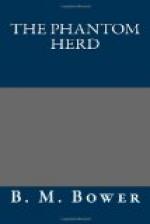With a good thousand feet of film spoiled through no real fault of his own, and with the expenses he knew he must meet looming inexorably before him, he simply could not afford a leading woman. Therefore, he must change his story, making it a “character” lead instead of the conventional hero and heroine theme. Chance—he called it luck—had sent him Annie-Many-Ponies, who “Wants no monies.” He must change his story so that she would fit into it as the necessary feminine element, but he was discouraged enough that night to tell himself that, just as he had her placed and working properly, the Indian Agent or her father, old Big Turkey, would probably demand her immediate return. In his despondent mood he had no faith in his standing with the Indians or in the letter he had written to the Agent. His “one best bet”, as he put it, was to make her scenes as soon as possible, before they had time to reach him with a letter; therefore he must reconstruct his scenario immediately, so that he could get to work in the morning, whatever the weather.
He read the script through from beginning to end, and his heart went heavy in his chest. He did not want to change one scene of that Big Picture. Just as it stood it seemed to him perfect in its way. It had the bigness of the West when the West was young. It had the red blood of courage, the strength of achievement, the sweetness of a great love. It was, in short, Luck’s biggest, best work. Still, without a woman to play that lead—
Luck sighed and dampened his pencil on his tongue and drew a heavy line through the scene where “Marian” first appeared in the story. It hurt him like drawing a hot wire across his hand. It was his first real compromise, his first step around an obstacle in his path rather than his usual bold jump over it. He looked at the pencil mark and considered whether he could not send for a girl young in the profession, who would be satisfied with her transportation and thirty or forty dollars a week while she stayed. He could make all her scenes and send her back. But a little mental arithmetic, coupled with the cold fact that he did not know of any young woman who was capable of doing the work he required and would yet be satisfied with a small salary, killed that new-born hope. He drew a line through the next scene where the girl appeared.
When he had quite blotted the girl from his story, he was appalled at the gap he must fill in the continuity and in the theme. He had left old Dave Wiswell, his dried little cattleman, a childless old man—or else a “squaw” man whose squaw has, presumably, died before the story began. Somehow he could not “see” his cattleman as one who would set aside the barrier of race and take a squaw for his wife. He could not see Annie-Many-Ponies as anything save what she was—a beautiful young savage with an odd adornment of civilized speech and some of the civilized customs, it is true, but a savage for all that. He did not want to spoil her by portraying her as a half-caste in his picture.




